As the famous saying goes: “A house is not a home without a pet” — and you only understand this once you get yourself a fluffy friend. Much as cats and dogs, smaller animals like guinea pigs, hamsters, and parrots make great housemates, too.
But if your family’s after a middle-sized pet, you might be looking for a bit of information on bunnies. So, are rabbits good pets, and more importantly, are they the right choice for your children?
Are Rabbits Good Pets Today: From Game to Playmates
Are rabbits good pets nowadays? Whatever your answer may be, consider that bunnies weren’t always our pets. But how did they manage to win us over?
Today, rabbits are some of the most beloved pets, and children especially adore them. But just as other domestic animals, rabbits belonged only in the wild before our ancestors decided to tame them. So when and how did this happen? The truth is, their domestication wasn’t the result of any single event but rather happened progressively.
Nevertheless, the most-cited story about rabbit domestication is the one dating from 600 AD. Around this time, Pope Gregory the Great proclaimed that rabbit fetuses are to be considered fish, not meat.
Thanks to this, Christians could eat them during their fasting periods, such as Lent. Ultimately, that’s why monks in Southern France first began hunting and then breeding wild rabbits.
While this story is the most popular of all the rabbit domestication tales, some archaeological evidence even suggests that people around France and Spain have been eating rabbits for 10,000 to 20,000 years.
Later on, during the Middle Ages, people transported rabbits across Europe and other parts of the world. Bunnies served as high-status food that only the affluent could afford.
So, rabbits were kept in fenced enclosures and bred for food. Naturally, they didn’t like living in captivity, so they dug underground holes to escape. And that’s the story of how they got their Latin name, Oryctolagus cuniculus, which means “digger hare.” Eh, what’s up, Doc?
In the 19th-century Victorian Era, rabbits won our hearts and managed to become our pets, too. However, a rabbit bone found at a Roman palace in Britain suggests that this animal was kept as a pet even during the 1st century. But are rabbits good pets nowadays? To see what life with a bunny looks like, stick around.
Are Rabbits Good Pets: Pros and Cons of Keeping a Bunny
If you’re thinking about adopting a rabbit, it’s better to know what to expect in advance. Keep reading to find out: are rabbits good pets for you or not? The following section will help you understand why bunnies are such popular pets.
Also, you’ll get to see the other side of the coin, which will help you prepare for bunny-parenting. Hopefully, they’ll manage to win your heart either way.
Why Are Rabbits Good Pets?
1. Your Rabbit Will Adore You

Decide to adopt a pet rabbit, and you’ll see just how social and loving these animals are. It may be hard to believe, but your bunny can shower you with more love than your cat. That’s because pet rabbits, unlike cats, seek affection. Chances are, your bunny will never get bored or annoyed as long as it has your attention.
Much like dogs who exhibit high-degree attachment to their owners, your rabbit will get obsessed with spending time with you. Without enough human contact, your pet bunny might even become depressed.
While this may sound intimidating, it just goes to show how much rabbits love to be around people. So, don’t forget about the playtime with your bunny because this friendly animal will adore every second of it.
2. Rabbits Can Make Animal Friends

Are rabbits good pets to have around other animals? It depends, but generally speaking, yes. Being social creatures, bunnies don’t only get attached to humans, but are also capable of making animal friends.
By far, the best option is to have a pair of rabbits living together. So, they’ll have sleeping, eating, and playing buddies even when you’re not around. The thing is, they’ll be much happier and more relaxed spending time with a cage-mate.
If you don’t want to neuter your bunny, you can always pair it up with an animal of a different species. Your bunny might prefer other rabbits, but it will get equally happy around guinea pigs.
Especially if you introduce the animals when both of them are young, they’ll become inseparable. However, you’ll need to pay attention to their slightly different diets.
3. You Can Train Your Rabbit
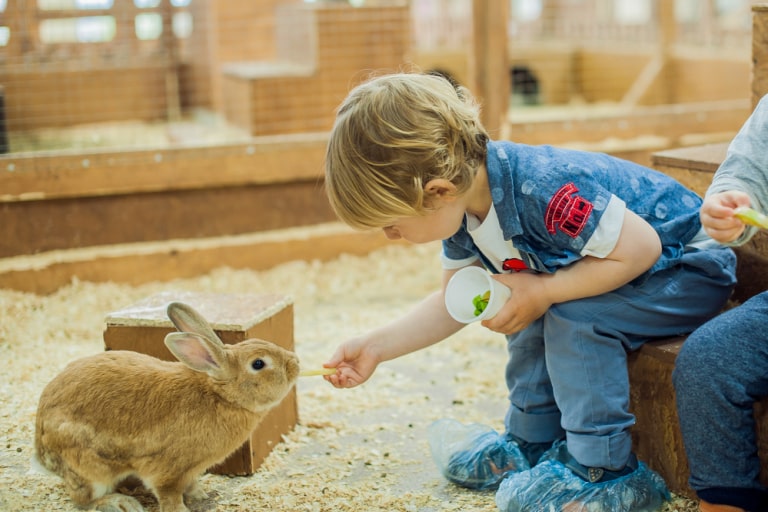
You might be surprised to hear that rabbits are intelligent creatures that love learning new tricks. While your pet rabbit may not have the same IQ level as your cat or dog, it’s still very inquisitive.
Thanks to their curiosity, you can teach your bunnies to fetch, stand up, or come when you call them. Plus, teaching your rabbit new tricks will be equally fun for you as it is for your pet.
The thing is, both you and your pet will need to be patient. Especially with the first few tricks, you’ll have to wait until your bunny decides to act on your request. On the other hand, the rabbit will be waiting to get its favorite snack. As it goes, rabbits mainly get motivated by food or rewarding cuddles.
4. Rabbits Are Quiet

If you’re looking for a pet that doesn’t make much noise, a rabbit won’t disappoint you. Unlike dogs, cats, parrots, or guinea pigs, bunnies neither whine nor squeal to draw your attention.
They can’t vocalize their needs, so they’ll keep quiet most of the time. Still, if you come too close, you’ll be able to hear your bunny grunting out of happiness during playtime.
Otherwise, you won’t even notice having a bunny around. As long as it has enough food and water, your rabbit will enjoy a little peace and quiet, too. But that doesn’t mean you should disregard its needs. In extreme cases when you do, your bunny will let you know by jumping around the cage.
5. Rabbits Don’t Smell

Some of the things you won’t have to worry about if you have a pet rabbit are unpleasant smells. By nature, rabbits are clean animals that spend a lot of time grooming until their fur is perfect.
Their bodies won’t have any odors whatsoever if you’re trying to smell them from a distance. And, if you come closer, your bunny’s fur is likely to have a pleasant, newborn-baby-like smell.
You won’t be bothered by the smelly cages either. That’s because rabbit feces are entirely odorless. However, you will be able to smell your rabbit’s urine thanks to its high ammonia content, but only right after urination.
Otherwise, if you regularly make sure the litter box/cage is clean, there won’t be any unpleasant smells coming from your bunny’s enclosure.
6. Bunnies Love to Be Petted
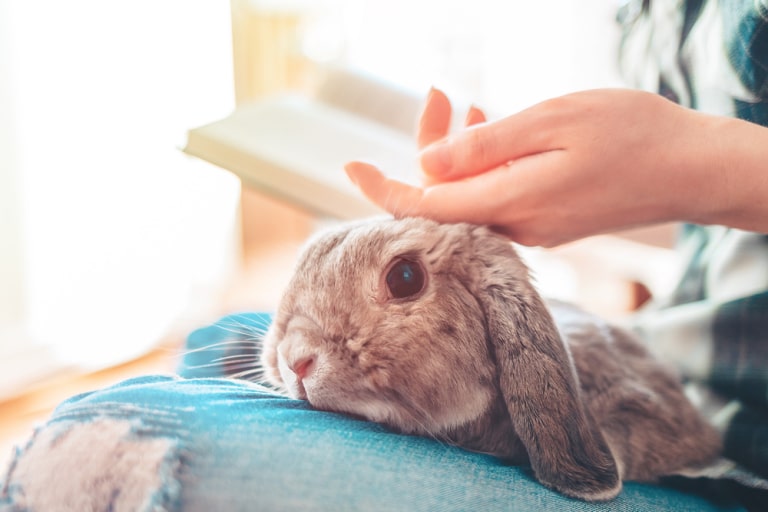
Rabbits make perfect pets because they enjoy being petted — as simple as that. Unlike cats which prefer being left alone, your bunny will melt with joy whenever your hand comes close. Adopt a rabbit, and you’ll see how long it can keep lying in one place as long as you pet it. So, if you wait for your bunny to get bored, you’ll be waiting way too long.
However, bunnies are delicate creatures, so you’ll have to know where exactly to pet them. The truth is, they won’t enjoy being pet on their bottom, feet, chin, or belly. These body parts seem to be more sensitive to tickling, which your bunny might not like. But touch your rabbit’s forehead, cheeks, or behind its ears, and it’ll be grinding its teeth out of joy.
7. Rabbits Live Long

Unlike their wild cousins that live about 1 or 2 years, domesticated rabbits can live up to 12 years. Naturally, the reason behind your pet bunny’s longer life span is the fact that it doesn’t get exposed to food scarcity or predators.
Also, your pet rabbit will be safe from catching some of the diseases that would be inevitable in the wild. And if it does get sick, you’re always there to take your bunny to the nearest vet.
Rabbits’ life expectancy makes them great pets because they’ll be around for a long time. They might not live longer than a dog or a cat, but they’ll have a similar impact on your life.
Think about it — if you’re lucky, you’ll get to spend more than a decade with your pet rabbit. But make sure your family’s ready for such a commitment before you adopt a bunny.
8. Bunnies Have Distinct Personalities
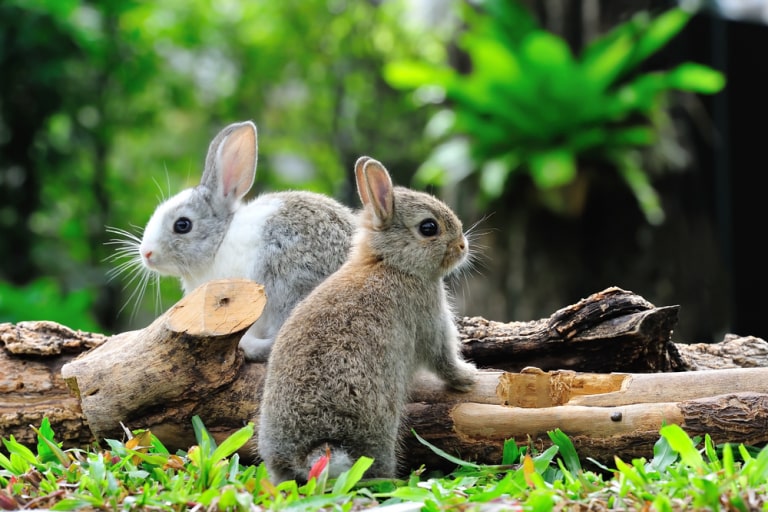
When you think about rabbits, you might be imagining a whole bunch of them in one place, all similar-looking. However, the herd will prevent you from noticing the unique behavior of each rabbit since they’ll all appear the same.
But bear in mind that each bunny has a different personality, much like each cat or dog. Hopefully, you and your rabbit will be a great fit.
Nevertheless, make sure to appreciate the unique nature of your pet, regardless of how well it suits you. So, respect your inquisitive bunny’s need to explore whenever it gets a chance.
But also understand your shy rabbit’s unwillingness to come near unfamiliar people or animals. After all, an animal’s behavior is something people shouldn’t try to change — and the same goes for pets.
9. Rabbits Don’t Need Much Space
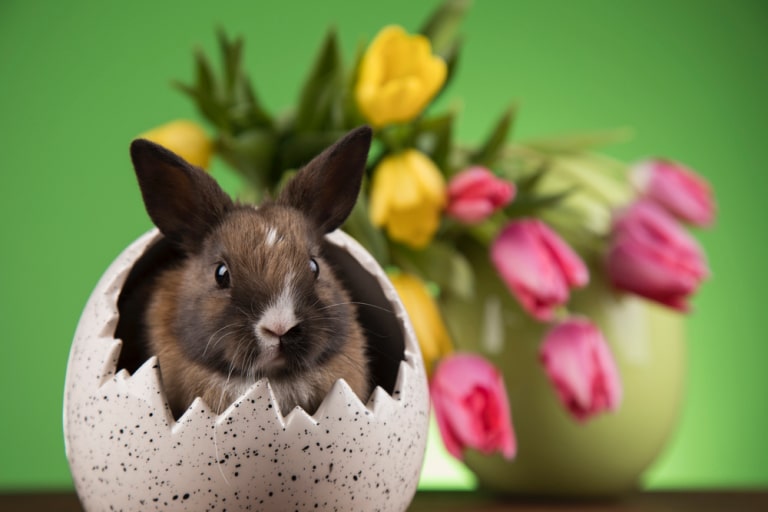
If you’re living in an apartment, a bunny will be your ideal pet since its cage doesn’t occupy much room. You might be surprised to hear that rabbits need less space than many other animals.
Even tinier pets, such as hamsters, like to keep active, which requires much room for tunnels and wheels. But a bunny spends most of its time lying and dozing off.
Plus, unlike cats and dogs, a rabbit won’t be running around your home all the time. Instead, it’ll be more than comfortable spending time in its enclosure. And when you take the rabbit out of its cage, it might still keep sitting in one place. Since rabbits don’t prefer smooth surfaces like hardwood floors, carpet borders are likely to be its limit.
10. Bunnies Are Gentle

As you’ve come to understand, each rabbit has a unique personality. Still, some generalizations have proven adequate for most pet bunnies. Their main species trait is that they are gentle and affectionate creatures. But what does this mean?
After the first encounter with your future pet rabbit, it might seem confused and shy. But when you get to spend more time together, your bunny will show you its warm, loving side. A bunny will always show its gratitude when you pet it. Plus, rabbits will rarely bite you — they’re more likely to chew on your clothes than your fingers.
Hopefully, your question: “Are rabbits good pets?” has an affirmative answer. But there’s also the negative side to keeping a rabbit.
Are Rabbits Good Pets: Let’s Consider the Cons of Keeping a Bunny
1. Rabbits Chew on Everything
Thanks to unique roots, rabbits’ teeth never stop growing. They can even become longer by 3 to 5 inches a year. That’s why they like to eat solid food. But also, this accounts for their need to gnaw and chew on things all the time.
Unfortunately, this means you’ll have to bunny-proof your house before welcoming the pet into your home. First and foremost, rabbits mustn’t have access to cables because electricity can harm or kill them.
Second, you’ll need to keep your expensive clothes, shoes, and books away from them. Also, don’t forget to pay attention to your bunny around furniture, especially wooden edges or table/chair legs.
2. Bunnies Have Tricky Diets

Rabbits are herbivores, which means they only eat plants — doesn’t sound that difficult, does it? But did you know that they have strict diets that you’ll need to follow to keep them healthy? Your bunny’s daily diet should consist mostly of hay. A rabbit should also have access to pellets, but only limited — otherwise, the bunny will become obese.
But what about fresh fruit and vegetables? The truth is, most of them should be avoided or given only in smaller amounts. For instance, citrus fruits can be harmful to the rabbit’s digestive system, making their bellies hard. And, while your little Bugs Bunny might adore carrots, keep in mind that they shouldn’t be its main meal.
3. Bunnies Dislike Being Held

Are rabbits good pets when compared to cats or small dogs?
You might’ve been unaware of rabbits’ unwillingness to stay in your hands for a long time (or at all). Unlike cats, bunnies don’t have such flexible bodies, and they can get uncomfortable quickly. Therefore, your bunny won’t be calm sitting in your lap or on your chest for too long. Instead, it can start misbehaving and digging in no time, leaving you in scratches.
Still, if you get a chance to hold your pet rabbit, you should know how to do it properly. Remember that rabbits always lean on their hind legs. So, if you’re carrying your pet somewhere, make sure its hind legs are leaning against your hand. This position will give them stability and ensure that both of you make it out alive and unharmed.
4. Rabbits Shed
Rabbits are all cute and fluffy, but there’s a dark side to their furry coats. Depending on the season, your bunny’s molting can present a problem for your family. Because rabbits’ hairs are light and soft, they usually end up in the air instead of on the floor. Thus, you can easily inhale them, which might result in an allergic reaction.
But remember to pay attention to the number of hairs your bunny leaves on your couch. It’s always a good idea to have a lint roller by your side to remove rabbit hair from soft surfaces.
You can also use it to make sure your clothes or carpets don’t have bunny hair all over them. Plus, your rabbit might let you remove the excess of its shedding fur accumulating on its body.
5. Rabbits Have a Sensitive Nature

Thanks to their ancestors often ending up as wild predators’ meals, even today’s pet bunnies get scared easily. Imagine what it’s like to feel like a rabbit caught in the headlights all the time. Sure, your bunny might feel safe around you, but it can still get alarmed even at the lowest noise. But why is this such a big con?
The fact that your rabbit is fearful means that you must always pay attention not to scare it. Otherwise, you’ll be seeing a lot of jumping or nervously running around the cage. The most famous rabbit move when it feels endangered is to thump its hind feet vigorously. This kind of reaction will let you know your pet is frightened and needs comforting.
6. Rabbits Have Fragile Bodies
Apart from having sensitive spirits, bunnies also develop many physical illnesses. Our cotton-tailed friends are very susceptible to heart attacks since even the tiniest inconvenience stresses them out.
So, you should always make sure your bunny doesn’t feel threatened in any way. Especially when you have other pets or young children, this task might prove more difficult than it sounds.
Rabbits are also prone to constipation, which is a more severe condition than you might have thought. Either a hairball or a piece of fabric they ate can stop the bunnies’ bowel function.
You might be surprised to hear that gastrointestinal stasis is the cause of way too many rabbit deaths. If you spot it in time, you can save your bunny by keeping it active and hydrated.
7. Bunnies Need Proper Care

Having a pet bunny means that you’ll have to take care of it from day one. Unlike cats and dogs, your rabbit won’t be able to leave the house and go “hunting” for food. Instead, a delicious meal has to be waiting for your bunny in its cage all the time. Plus, it doesn’t eat what the rest of the family dines on, so rabbit food must always be around.
Apart from looking after your bunny’s health, you’ll need to care about its enclosure, too. So, a regular cage cleaning and the disposal of bunny feces are a must a few times a week. Even though rabbit feces don’t smell, you’ll be amazed at how much cottontails excrete. On average, a bunny will dispose of 500 pellets a day.
8. Your Bunny Can Escape

Apart from being well-known for their sensitive nature, rabbits are also famous for their speed. Running fast seems to be in their genes as they’ve needed it to escape from predators throughout their evolution.
Unfortunately, this means your bunny might try to escape whenever it gets a chance. Fastening its cage is always an option, but what should you do when your bunny’s playing outside?
An open, outdoor space is where you’ll be able to see a lot of bunny zoomies. Rabbits’ hyperactive episodes often result in their owners not being sure how to catch them. While this may be fun at first, it can prove frustrating later on. Plus, you’ll need to think about your rabbit’s safety when it decides to wander off out of the blue.
9. Keeping a Rabbit Might be Expensive
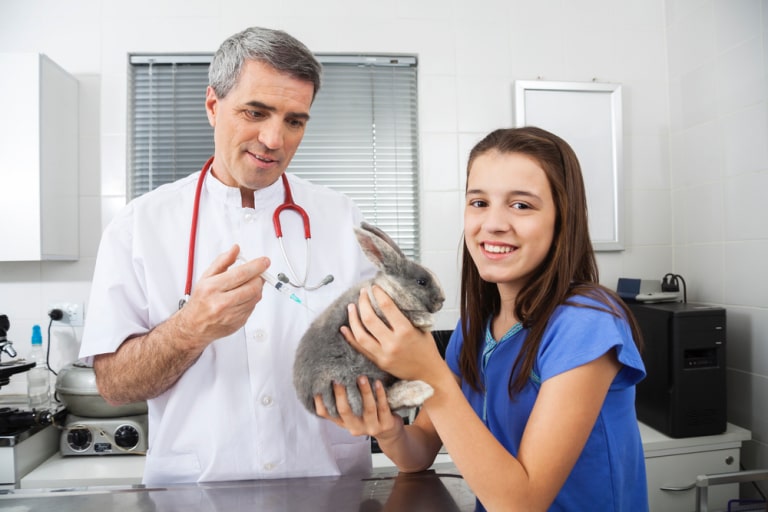
Buying a rabbit won’t cost you much — somewhere between $40 and $100, depending on the breed. However, you’ll need to have enough spare money to buy your new bunny everything it needs.
So, if money isn’t an issue, be prepared for several one-time purchases in the beginning. Your rabbit will require a cage for sleeping, a pen for exploring its new home, as well as a covered run for spending time outdoors.
Also, you’ll need to think about how much money you’ll need for pellets, litter, and other consumable necessities. Food and water bottles for your bunny will also require regular charging. Plus, costly vet visits might be necessary more often than you’d think.
Especially if you want your rabbit spayed/neutered or vaccinated, going to the vet might drain your wallet.
10. Bunnies Need Company

While this isn’t necessarily a con, you still need to consider it before you’ve adopted a rabbit. As you’ve come to know, bunnies are social and friendly animals. They enjoy spending time with humans as well as fellow animals. Without a companion, your bunny might get bored or even depressed.
So, you’ll need to have a lot of time at your disposal to play with your new bunny. If you’re unable to spend at least 2 hours a day on your rabbit, it’ll need a cage-mate. However, getting your bunny a friend might prove difficult as you’ll need to consider how the animals will get along. If you can neither keep it nor get it company, maybe a bunny shouldn’t be your choice.
Are Rabbits Good Pets for Children?
These floppy-eared animals might have already won your heart. So, will the other members of your family love them as much as you do? Chances are, your children will adore them even more. But are rabbits good pets for children or are they not the right choice?
Here are some of the things you’ll need to consider regarding the relationship between children and pet bunnies.
1. Children Will Love Rabbits

There’s no arguing your children will love spending time around their new pets. Your bunny’s fluffy tail, floppy ears, and twitching nose will be too difficult to resist. Chances are, you won’t be able to separate your child from their pet for a long time. Cuteness overload, indeed.
Children also have enough time at their disposal to play with their fluffy housemates. That’s a win-win situation since both your bunny and your child end up getting a playing buddy. So, you’ll no longer need to run against the clock to spend some time with your lonely rabbit. Also, your child won’t be seeking your attention all the time.
2. Keeping a Bunny Will Teach Your Child Responsibility
Bunnies are good pets for children because your child will become more mature and responsible around such a pet. The thing is, bunnies aren’t a huge responsibility, as they don’t need so much attention like cats or dogs.
On the other hand, you can’t neglect them for a long time because they will protest. Therefore, if you want to teach your child how to take care of an animal, adopt a bunny.
With a pet bunny in the house, your kid will have something to do. They’ll need to feed it, give it water, and change its litter regularly. Also, your child will have to look after their pet during playtime. On the other hand, such responsibility shouldn’t be something your kid can’t handle.
Still, while bunnies can be good for children, the reverse isn’t necessarily true. That’s why you should consider some of the cons of having a pet rabbit and a young child. So, are rabbits good pets for young children and why not?
3. Bunnies Dislike Loud Noises
You’ve already seen how sensitive rabbits can get. Everything from sudden movements to loud noises seems to scare them. And when they smell trouble, bunnies can have a severe physical reaction that might be difficult to stop. On the other hand, small children tend to be hyperactive and misbehave a lot.
Thus, your young child can frighten their pet rabbit with an unexpected loud movement. Young kids also tend to scream a lot during playtime, which your bunny won’t like a bit. Even if you tell your toddler to lower their voice around the rabbit, they might not listen. Therefore, you might want to wait until your child gets a bit older to adopt a bunny.
4. Rabbits Are Fragile
Another “dealbreaker” with rabbits is that their bodies are fragile, so they often get hurt. On the other hand, young kids tend to be inconsiderate or uncareful. They can also be completely unaware that they’re hurting the animal. For this reason, having a young child around such a pet might not be the best idea.
Bunnies also dislike being held, carried around, or dressed up. On the other hand, toddlers enjoy doing this with their dolls and toys. Chances are, they might behave the same way around a “living toy.” Because toddlers might not understand the seriousness of the situation, it’ll be best to wait with the bunny adoption.
Hopefully, this has answered your question: “Are rabbits good pets for children?”
Bonus: What’s Your Bunny’s Body Language Telling You?

Reading about bunnies never seems enough, so here’s one final Easter egg. Hopefully, you’ve managed to find the answer to your question: “Are rabbits good pets?” But will the members of your family be good rabbit owners? Here’s how you can tell whether your bunny is content living with you.
How to Tell if Your Rabbit Is Happy Around You
Bunnies are the happiest when their body seems relaxed. So, your rabbit might be lying with its feet stretched out or tucked under its belly. On the other hand, your bunny’s also happy when it’s hopping and doing zoomies around the house.
You can even do a nose twitching test — if your bunny’s nose is moving up and down quickly, your pet is probably feeling great.
How to Tell if Your Rabbit Is Unhappy Around You
Bunnies’ lowered ears are probably the best indicator that your fluffy friend is feeling down. Also, you should never neglect your bunny’s thumping with its hind feet, because this means it’s anxious and scared.
Stressed and unhappy rabbits will also seem tense and try to run away or hide from you. And if you notice the lack of nose-twitching, your rabbit might not be feeling very content.
Considering all of the above, are rabbits good pets for your family?
Are Rabbits Good Pets: Final Thoughts
Fluffy little bunny loaves might have won your heart thanks to their irresistibility. Still, you might be asking yourself: “Are rabbits good pets?” The truth is, there are many pros and cons to keeping a rabbit.
For starters, your friendly, gentle, and affectionate pet rabbit won’t make any noise around the house and won’t smell. You can also pet your bunny whenever you want, play with it, and teach it new tricks. On the other hand, bunnies chew on things, shed a lot, and can be expensive. They have tricky diets and need proper care and attention.
But are rabbits good pets for children? Having a pet bunny to take care of might be a great way to teach your kid responsibility. But you’ll get to see that younger children and rabbits don’t make the best housemates. Since toddlers are loud and aren’t that careful, they can easily hurt their sensitive and gentle pets.
If you want to adopt a bunny, you can check how happy your new friend is around your family. Its body language will reveal a lot, so pay attention to your bunny’s nose, ears, and feet. In case your rabbit seems content, enjoy every second with your new BFF — your bunny will enjoy your time together twice as much.

